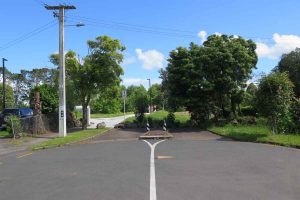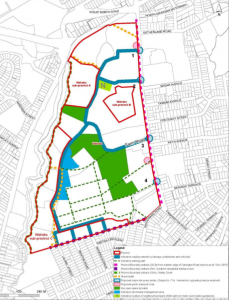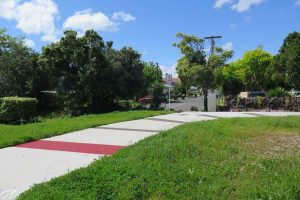The Ngati Whatua land runs along the southern edge of the Unitec precinct – and adjacent Laurel St will carry the through traffic. Picture: Bruce Morris
The giant Unitec plan to develop a new township with up to 3000 homes has taken a surprise step forward – and the right of local residents to have a say on the shape of the first stage has been rejected.
Ngati Whatua iwi, which owns land along the southern boundary of the Unitec block (known under the Unitary Plan as the Wairaka Precinct), has been granted Auckland Council permission to create a new subdivision next to Laurel St. The new walking and cycleway runs through it.
The application by the iwi development company was approved by duty commissioner Leigh McGregor, despite the objections of Auckland Transport and the misgivings of the lead council planner.
Now, unless there is a judicial review of the decision, the iwi can start work immediately to create a road around the 1.779ha area within the Unitec precinct (previously a carpark) and, once it has been formally vested, run it through Laurel St. Contractors can also start to lay general infrastructure like power and water.
 As the total precinct development advances over the years ahead, Laurel St will become a busy thoroughfare rather than the quiet little cul-de-sac it is today. (Picture shows the end of the cul-de-sac where it meets the cycle and walking pathway – and the Ngati Whatua land.)
As the total precinct development advances over the years ahead, Laurel St will become a busy thoroughfare rather than the quiet little cul-de-sac it is today. (Picture shows the end of the cul-de-sac where it meets the cycle and walking pathway – and the Ngati Whatua land.)
The subdivision land – 40 per cent of the total iwi precinct holding – is zoned terraced housing/apartment under the Unitary Plan and the application suggested 60 standalone houses or 120 apartments were planned.
However, no resource consent has yet been granted for the development of the new lots and it may be that a higher density will eventually be sought.
Because of the lack of a traffic assessment for the whole precinct, Auckland Transport didn’t support the application. That led the council’s consultant planner to recommend a series of conditions before she would agree to the non-notification sought by the iwi.
When the iwi lawyers resisted the conditions, the planner removed them and recommended notification instead.
 The legal team then found an ally higher up the planner chain and the duty commissioner decided the application should be non-notified and approved. In other words, local residents have been declined a say.
The legal team then found an ally higher up the planner chain and the duty commissioner decided the application should be non-notified and approved. In other words, local residents have been declined a say.
The decision will be a surprise and disappointment to locals because it was made clear under the Unitary Plan provisions that consents of this type within the precinct would only be granted after formal traffic assessments.
To some eyes, it seems as if the council has bowed to the pressure of an applicant and ignored the rules outlined in the creation of the precinct.
Wairaka Land Company, Unitec’s own development wing, has been working for some months on that assessment, providing data for Auckland Transport. But it has still not been finalised and it would have been a surprise to Unitec that the iwi has been able to persuade the council its application should be granted without the detailed information.
Local town planner Craig Magee, who, with the Mt Albert Residents’ Association (MARA), has been a key voice articulating local concerns, says it’s extremely unfortunate and frustrating the council is approving consents in the precinct without an approved traffic assessment.
 “This was a critical matter to MARA and many concerned residents who live to the south of the precinct, as evidenced by the time and effort we all went through during the Unitary Plan hearings,” he says.
“This was a critical matter to MARA and many concerned residents who live to the south of the precinct, as evidenced by the time and effort we all went through during the Unitary Plan hearings,” he says.
“We were successful in demonstrating that Unitec had not undertaken sufficient traffic assessments, and the precinct was only enabled on the basis that a comprehensive and agreed-upon traffic assessment (an ITA) would be provided before any consenting.”
Mr Magee says this point was explicitly spelt out within the precinct provisions.
“But, despite this, as well as Auckland Transport’s objections and the council’s own reporting planner recommending notification of the application, Auckland Council appears to have acquiesced to pressure from the applicant and set aside the requirements of their own Unitary Plan.
“This is not a good start in terms of how development in the precinct is to be considered by Auckland Council.”
Bruce Morris
Full backgrounder on the Unitec project and its path through the Unitary Plan process







